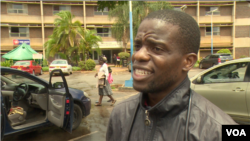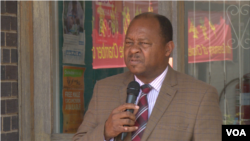Zimbabwe's President Emmerson Mnangagwa did not speak with the media after his closed-door meeting with aggrieved teachers to try to avert a full-fledged nationwide strike by government workers. But Takafira Zhou, president of the Progressive Teachers Union of Zimbabwe, told reporters that his team did not mince words.
"We have told him that if teachers would not report to work [in January], it's not that they do not want to work. It is because they are incapacitated," Zhou said. "The challenge is now with him to bring a reprieve that can allow teachers to continue to go to work.
"Do you think that's going to happen before schools open? That can be successfully be answered by him. But we have told him the situation."
The teachers want to be paid in U.S. dollars, not Zimbabwe bond notes.
Zimbabwean doctors, who entered Day 21 of their strike on Friday, also want their salaries paid in U.S. dollars. But Prince Paul Butau of the Zimbabwe Hospital Doctors Association said salary was not the only issue doctors wanted addressed.
"We won't be doing any good to the patients if there are no medications to use at the hospital," he said. "Doctors want all our grievances to be addressed by the employer so that we go back to work. We are not only taking about money — we are also fighting for our patients. It does not make sense whereby you admit a patient for a procedure or [treatment] and you do nothing. The patient spends a lot of time in the wards thinking that he is being helped, whilst accumulating hospital bills for staying for nothing."
The doctors said the Mnangagwa government was failing to provide protective clothing for doctors, exposing them to transmittable ailments from patients.
Once the envy of most developing countries, Zimbabwe's health and education sectors have deteriorated over the years, largely dependent on the assistance of international organizations such as the U.S. Agency for International Development and the European Union.
But those aid organizations do not pay doctor salaries. That is the responsibility of Zimbabwe's government, and the salary issue has resulted in low morale among workers in several industrial settings.
When doctors began their strike, Health Minister Obediah Moyo said the Zimbabwean government was too broke to meet their demands, including payments in U.S. dollars.
Butau said Friday that the situation was "very dire" in Zimbabwe's hospitals as casualty workers — those that attend to emergency cases — had "scaled down" their work.






